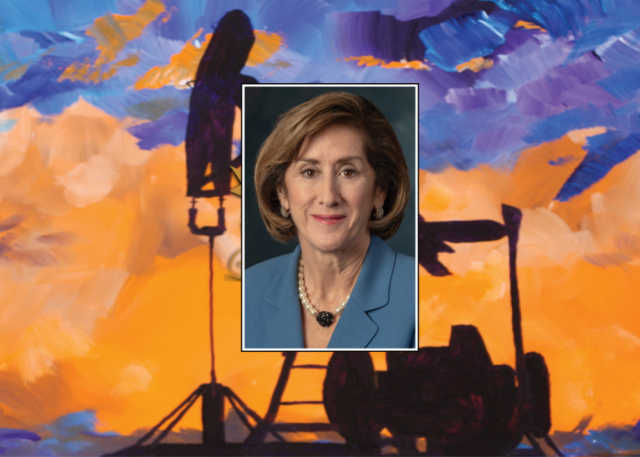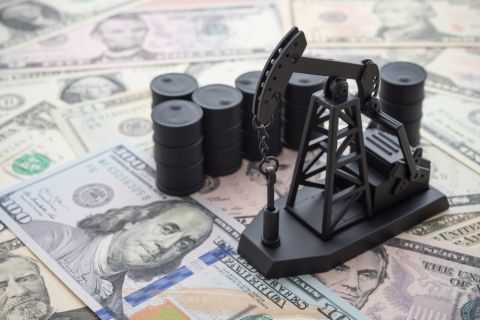
[Editor’s note: Julie Robertson will take on a new role at the close of the company’s next annual shareholder meeting as part of a leadership transition announced in February.]
On a June day in 1979, a newly minted The University of Texas at Austin graduate named Julie Robertson began her first job at a drilling company in Houston. Notwithstanding mergers and corporate consolidations, she never left. As she grew in her career, so did her company. Now, she runs the place.
“Sometimes it can be very daunting to realize that everybody’s looking to you for the answers,” Robertson says. “Actually it’s very rewarding because I think if you’re invested in the company you work in, in good times or in bad times, it’s a complete privilege and honor to run a company.”
At the start of Robertson’s career, times were good. She wrote maintenance and drill pipe manuals for Noble Corp., a land drilling contractor at the time, and spent a fair number of weekends driving to rigs to talk to crews and learn how they used the equipment she wrote about. She met some resistance, particularly from a gruff construction manager named Don LaBorde.
“He thought that whoever hired me had done a very poor job, and he determined that I would never be able to write anything about a piece of equipment that I didn’t understand,” Robertson says. “He was an incentive to me early on because, at 22 years old, I thought, ‘OK, this guy isn’t going to tell me that I don’t know how to do this.’”
Click here for the 25 Influential Women In Energy special report.
Take a look at all of the Women In Energy honorees.
She did show him that she could learn the business, and LaBorde later became a good friend. The experience also primed her for a career break, which ironically coincided with the breaking of the oil industry.
“I entered at a time when business was very, very good, and within a couple years, it was very, very bad,” Robertson says. “During the downturn years, every week it seemed we were having a layoff. If you survived the layoff, then you had X number of more responsibilities the next week.”
In retrospect, it was a boon for a young up-and- comer. “I learned a lot that way,” she says. “I never would have had the opportunities that I had if the industry had been in great shape and we were off to the races. We would have had plenty of people and I would have had my responsibilities, and that would have been all.”
In today’s slump, the experience could be a blueprint for young, ambitious professionals— at least for those possessed of a Julie Robertson-caliber work ethic.
“We’re all paring back; we all have far fewer people than we had five years ago, and people are all doing more with less,” she says. “It’s a great opportunity for people to get in and roll up their sleeves if they want to do that.”
Specifically, Robertson urges industry rookies to spend the time to understand the business. Driving out to a rig, as she did, may no longer be feasible (Noble’s operations are in predominantly foreign offshore locations), but there is knowledge to be gained in an office tower, too.
“Spend some time with the accounting or finance department to understand financials,” she suggests. “No matter what end of the business you end up in, you have got to understand how we manage budgets and how we manage five-year plans.”
Among Robertson’s mentors was Jim Day, the company’s longtime leader, who provided her with the on-the-job equivalent of an MBA. The experience taught her how to analyze an acquisition target, value it, close the deal and integrate assets into the company.
“He included me at much higher levels than I deserved,” she says. “And I was able to move from there to where I was more outward facing for the company, and I dealt with investors more and certainly dealt with clients more and industry associations.”
The education never ends, she says, even for the CEO, especially as she guides Noble through another downturn.
“Trust me,” Robertson says. “I am learning every day.”
Recommended Reading
What's Affecting Oil Prices This Week? (April 15, 2024)
2024-04-15 - While concerns about the stability of oil supply are increasing, Stratas Advisors does not expect oil supply to be disrupted – unless there is further escalation in the Middle East.
What's Affecting Oil Prices This Week? (April 8, 2024)
2024-04-08 - Stratas Advisors says geopolitics are providing a boost for oil prices as conflicts escalate–and while crude oil and oil products continue to flow, the possibility of disruption is increasing.
What's Affecting Oil Prices This Week? (Jan. 29, 2024)
2024-01-29 - For the upcoming week, Stratas Advisors forecast that increase in oil prices will be moderated likely due to the U.S. being cautious in response to the recent attack on U.S. troops.
Kissler: The Challenge for Oil is Falling Demand, Despite Heightened Middle East Conflicts
2024-02-09 - Even though demand is the bigger weight on traders’ minds right now, Red Sea attacks and the U.S.’ “shadow war” with Iran still have the potential to impact the global oil supply, and consequently, prices.
Paisie: Economics Edge Out Geopolitics
2024-02-01 - Weakening economic outlooks overpower geopolitical risks in oil pricing.





